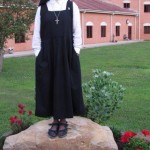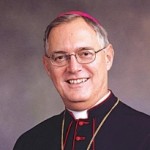
New Monastery Going Up Through the Efforts of Five Women
Politics is opportunistic; in the wake of the last three weeks unending coverage of the decades-old scandals in the Catholic church, Lisa Miller of Newsweek has decided that this is the time to push for the feminist interests.
The chasm between the church’s stated principles and its functional reality yawns wide. In the U.S., 60 percent of Sunday massgoers are women; thus most of the contributions to the collection plate—$6 billion a year—are made by women. And yet the presence of women anywhere within the institutional power structure is virtually nil. The number of women who hold top-tier positions in any of the dicasteries, or committees, that make up the Vatican structure can be counted on one hand. Few women retain high-profile management jobs, such as chancellor, within dioceses. And though nuns dramatically outnumber priests worldwide, they are mostly so invisible that when a group of them speaks up, as they did recently on health-care reform, everyone takes notice.
That is staggering nonsense on several levels, but I am most offended by the absurd last sentence; it apparently does not occur to Miller that the only reason the dissenting religious sisters were “noticed” for their opinion on the health care bill is because they were in alignment with the sentiments of the press; those thousands of sisters who spoke up against the health care bill (pdf) and sided with the Catholic Bishops? They were still quite ignored, quite invisible. Everyone didn’t take notice, after all.
Writing in the Media Blog for the USCCB, Sr. Mary Ann Walsh addressed Miller’s piece:
Lisa Miller’s accompanying cover essay about women in the church doesn’t go in this direction, however. In fact, it is somewhat off-base, like facile cocktail party conversation. Observations get tossed about without scrutiny. For example, she states, wrongly, that “few women retain high-profile management jobs, such as chancellor, within dioceses.” Fact-checking proves that wrong. If you take the requirement for ordination off the table, data shows that the number of women in leadership positions in Catholic dioceses is comparable to that of the women in the U.S. workforce as a whole. (pdf) One quarter of diocesan positions at the highest level, such as chancellor or chief financial officer, are held by women. You don’t find similar numbers among U.S. corporations.
Influence in the church does not depend upon ordination, though there is no doubt that it helps. . . . Historically, some women even have overshadowed popes. Most educated people have heard of Teresa of Avila and Catherine of Siena. Does anyone, even the highly educated, know who the popes were when these women lived?
In fact, I’ll take that a bit further:
The fact is, for all of the talk about how oppressive the church has been for women, there has been no other institution in history which has given women such free reign to create, explore, discover, serve, manage, build, expand, usually with very little help from the coffers of the diocese in which they worked, and often with little to no intrusion on the part of the male hierarchy.
And these have not been mealy mouthed “sheeplike” women, but educated, accomplished women who have chosen their lives because they could do nothing greater with their gifts. Rose Hawthorne, daughter of Nathanial Hawthorne, founded the Hawthorne Dominicans, an order of nuns who take care of cancer patients – free of charge – and who subsist entirely on donations. The Grand Duchess, Elizabeth left her royal privilege behind to serve the poorest of the poor and suffered a 20th century martyrdom. The daughter of General Patton joined forces with a nun, Mother Benedict, in France after WWII to come to America and form the Abbey of Regina Laudis, an abbey that is still attracting educated women, sculptors, writers, linguists, musicians – creative women – to use their gifts in the praise of God and for the good of us all. Did I mention that Mother Benedicta, before she became a nun, was a medical doctor who helped to hide and treat Jews who were being hunted by the Nazis?
I can go on…Mother Theresa built an international order of women which thrives, doing work no one wants to do, wouldn’t do in a million years. For that matter, she might seem quite mad – she probably is – but there is in Alabama an extraordinary and strange woman named Mother Angelica, the media-mogul you never heard of, who founded a Franciscan monastery and church in (of all places) the hottest bible belt in the deep South, and then – with two hundred dollars ($200.00) and no help from her bishop – was inspired to build a television station (and a radio station), which has become EWTN, a global Catholic network – also founding an order of friars – while hobbling around on crutches, yet.
Extraordinary, mad women, all of them! And I cannot think of a single institution on the face of the earth other than the Catholic Church which would have allowed them to run with their madness, BE who they were and accomplish great things.
The church gets a bad rap in this area. She has fostered literally thousands of great, great women, whose accomplishments are unjustly overlooked because they were done in a habit and a wimple. Compare them with the ‘ideal’ of today’s “smart, educated, successful” woman, like . . . Maureen Dowd, who only yesterday was whimpering about how difficult it is to be a celebrated woman in a position of prestige and power because – you know – men are so mean! The contrast could not be more stark.
The urge to serve the church and its people is a calling, one that starts not with a “give me” but with a “please take.” The expressed resentment over ordination seems less about an offer of service being refused than an acquisition of power being denied. If modern women desire ministry within the church, there is nothing stopping them from serving, and there never has been. Teresa of Avila managed to reform an order and build dozens of monasteries for both men and women, without waiting around for someone to tell her she could, without so much as a certification, or a humble degree from a state college, and -most importantly- without insisting that her own terms be met before she could give her all.
Sometimes I wish modern women would man-up and go do great things – like these women from centuries ago and from the last few decades – who managed to get so much done without all the bellyaching. The church could use their help.
Related:
Mary’s Aggies











